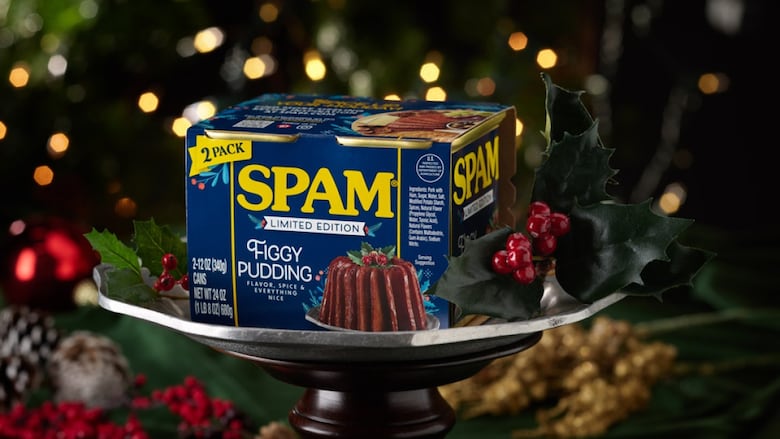Behold figgy pudding Spam, the 'unholy' holiday canned pork blasted with citrus
'It was probably one of the worst things I've ever tasted,' says Washington Post food writer

Emily Heil describes figgy pudding Spam as "an unholy, eggnog-fueled tryst between a hot dog and a fruitcake."
The limited-edition holiday fare takes Spam's classic canned pork product and adds flavours intended to be reminiscent of figgy pudding, an old-fashioned British dessert.
As a food writer for the Washington Post, Heil got her hands on the holiday Spam before it was unleashed upon the greater public earlier this month. At first, she says she was eager to give it a whirl.
"I'm a food reporter. I do a lot of tasting of weird stuff. A couple of weeks ago, I tasted clam flavoured mayonnaise … so I am very open minded," Heil told As It Happens guest host Peter Armstrong.
But the combination of processed meat and artificial orange flavouring, she says, was too much for even her permissive palate.
"It was probably one of the worst things I've ever tasted," she said. "I immediately demanded combat pay from my bosses, and they seemed kind of sympathetic to this."
You can read Heil's review of the holiday treat at the Washington Post.
Oh, bring us a figgy pudding
For the uninitiated, figgy pudding is a traditional British holiday dessert that usually contains neither fig nor what North Americans would call pudding. Rather, it's a dense, steamed cake with varying ingredients, including raisins, currants and brandy.
It's perhaps best known for being referenced in the Christmas carol We Wish You A Merry Christmas, which includes the line, "Oh, bring us a figgy pudding," and later threatens: "We won't go until we get some."
Hormel Foods, the makers of Spam, attempted to capture the figgy pudding taste by adding a mixture of spices and flavourings — including cinnamon, nutmeg, ginger, allspice, cloves, and artificial fig and orange — to its classic canned pork.
In a press release, the company called it "a savoury, sweet and comforting treat" that "evokes a sense of nostalgia and warmth, taking consumers back to their favourite memories from holidays past."

The reviews, like Spam, are mixed.
One online customer called it a "cursed item" that will "haunt you to the grave." The Takeout's Dennis Lee declared that he "probably wouldn't go so far as to say it belongs in a dumpster," and noted it tastes "OK" as a supporting ingredient in other recipes.
Heather Martin of NBC's Today cooked it up in a variety of dishes and poetically concluded: "With nods to holiday food traditions all around the world, from the Pacific Rim to merry old England, its many layers of flavours are matched only by the proud diversity of our nation's populace itself."
'I am not, like, a big Spam eater'
Heil admits she's not experienced in cooking with Spam.
"It is very big in some cultures. Huge in Hawaii. People do really delicious things with Spam, so I'm not knocking Spam as a category," she said. "[But] I'm not super familiar, so I went with the really basic, simple preparation."
That is to say, she sliced it up, and fried it.
I brushed my teeth. I drank lots of water. And that figgy pudding Spam just lingered.- Emily Heil, Washington Post food writer
When she tried it, she says she was immediately blasted by an "overwhelming" kick of artificial orange.
"I admit there are good fruitcakes in the world, but there are plenty of bad ones. And this tastes overwhelmingly like a very bad fruitcake and a hot dog sort of combined into one," she said.
Then came the aftertaste.
"I brushed my teeth. I drank lots of water. And that figgy pudding Spam just lingered. It was not going anywhere," she said.
Hormel declined to comment about the product's reviews. But bad press or good, the figgy pudding Spam has already sold out on Amazon and Walmart.
"My deep suspicion is that this is sort of a novelty play for buzz," Heil said. "It is the kind of thing that people talk about."
But she won't be partaking a second time.
"Barring some sort of hostage situation or a very large payment, that's really the only scenarios I could imagine under which I might eat this thing again."
Interview with Emily Heil produced by Brianna Gosse.

